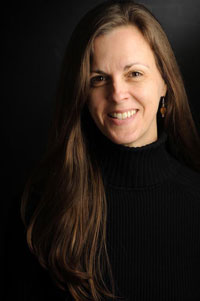Here is one of the qualities I treasure most in Etty Hillesum: For all the grace and intention she brought to doing her soul work, and for all the skill she possessed in navigating and negotiating the relationship between her inner and outer worlds, she never presented herself as someone who had mastered the spiritual life (and likely would have thought the notion ludicrous). Nor, in her persistent ability to cultivate a sense of hope and an appreciation of beauty, did she give the appearance of one who was naive or oblivious to her circumstances. Etty was not the Pollyanna of the Holocaust. She did not use her diary to escape from or mask what was unfolding in the world around her or within her own self. Her insight and wisdom were grounded in an ability to look at the world and herself with a growing honesty and depth.
In the next-to-last entry in her diary, written during a trip home from the labor camp at Westerbork while she was, as she put it, “more or less bedridden” because of illness, Etty writes beautiful and evocative words describing some of her impressions that “are scattered like glittering stars on the dark velvet of my memory.” As she closes this entry which recounts these impressions, she writes, “A soul is forged out of fire and rock crystal. Something rigorous, hard in an Old Testament sense, but also as gentle as the gesture with which his tender fingertips sometimes stroked my eyelashes—”
But then, that evening, she picks up her pen again and writes, “And then there are moments when life is dauntingly difficult. Then I am agitated and restless and tired all at once….All I can do is to lie motionless under my blankets and be patient until I shed my dejection and the feeling that I’m cracking up being scattered to the four winds….One must also accept that one has ‘uncreative’ moments. The more honestly one can accept that, the quicker these moments will pass. One must have the courage to call a halt, to feel empty and discouraged—Goodnight.”
Etty did not hesitate to convey her sense of struggle in her diaries or in the many letters she wrote to friends. A particularly telling example of this comes from a letter she composed while in the Westerbork labor camp, just a few months before her death at Auschwitz. She wrote, “When I think of the faces of that squad of armed, green-uniformed guards—my God, those faces! I looked at them, each in turn, from behind the safety of a window, and I have never been so frightened of anything in my life. I sank to my knees with the words that preside over human life: And God made man after His likeness [Genesis 1:27]. That passage spent a difficult morning with me.”
Questions for reflection
What do you do with your own internal struggles, your moments of difficulty, your occasions of frustration, your moments of weariness or despair? Do you have a way—with a practice such as writing or with a trusted listener—that you can bring these struggles into a place of safety where you can look at them, wrestle with them, learn what you need to learn from them, and then let them go?
Etty’s words are from Etty: The Diaries and Letters of Etty Hillesum 1941-43 and can also be found in an abridged version of her work, An Interrupted Life: The Diaries of Etty Hillesum 1941-43.
